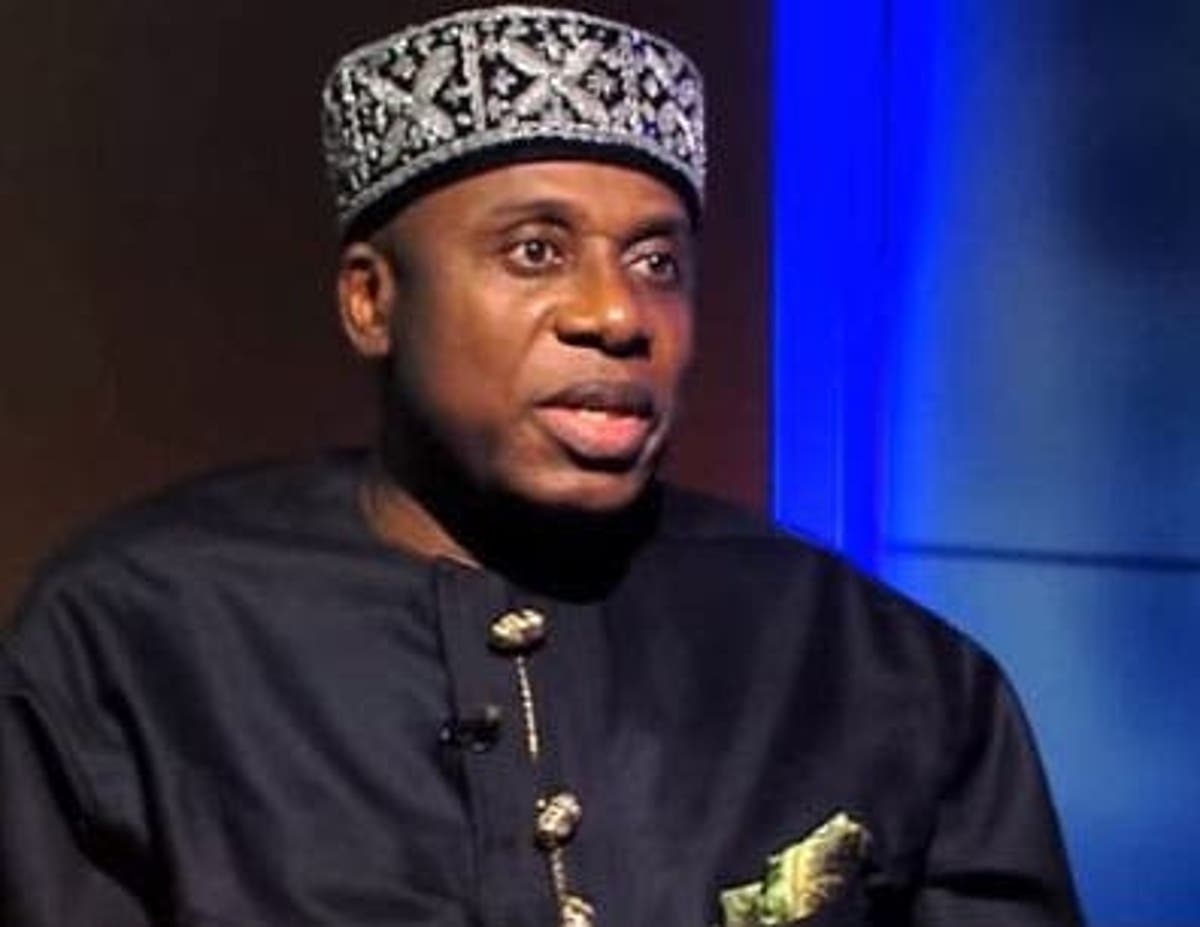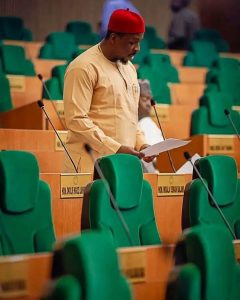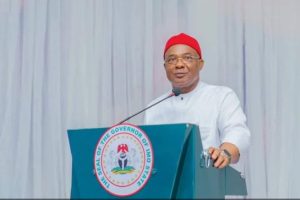I’m Hungry, Says Amaechi After Two And Half Decades Of Active Politics
In the twilight of a political career that has spanned over two decades, Rotimi Chibuike Amaechi—former Governor of Rivers State, former Minister of Transportation, and one-time presidential aspirant—stood before an audience on Friday, not as a man basking in political triumph, but as a citizen echoing the cries of a nation in despair.
At an event organized to commemorate his 60th birthday, Amaechi offered what may well become one of his most honest and stinging critiques of Nigeria’s current state. His remarks were neither veiled in diplomacy nor filtered by partisanship. They were raw. Unfiltered. A combination of personal disillusionment, patriotic concern, and political provocation.
“We’re all hungry,” he said. “If you’re not hungry, I’m.”
In these few words, Amaechi touched the nerves of millions of Nigerians grappling with economic hardship, political disillusionment, and a palpable lack of faith in the country’s trajectory.
Rotimi Amaechi’s political journey began in the early days of Nigeria’s Fourth Republic. He was the Speaker of the Rivers State House of Assembly from 1999 to 2007—a tenure that earned him national recognition and saw him become the first Chairman of the Conference of Speakers of State Legislatures in Nigeria.
In 2007, he was elected Governor of Rivers State, a role he occupied until 2015. During this period, Amaechi was also Chairman of the Nigerian Governors’ Forum, a powerful bloc in national politics. Following this, he was appointed Minister of Transportation by then-President Muhammadu Buhari—a position he held from 2015 to 2022.
Despite these achievements, Amaechi’s remarks at his birthday event signal a deep personal and ideological disconnection from the state of the nation and, perhaps, from the party he once helped to build.
In a country where inflation has spiraled out of control, fuel prices have doubled, and the value of the naira has plummeted, hunger is more than a metaphor—it is a daily reality for millions. Yet, hearing it from a man of Amaechi’s stature was jarring.
His statement, “We’re all hungry,” was not just a personal lament. It was a critique of the failure of governance, of Nigeria’s elite political class, and of a broken economic system that benefits the few at the expense of the many.
“I look at Nigeria and ask what are we doing here? Do we really want to be a country?” he asked.
This rhetorical question resonates with a growing national sentiment: that the Nigerian state is failing—or perhaps never truly formed in a way that centers the welfare of its citizens.
YOU MAY READ
EXCLUSIVE REPORT: Suspended Rivers Governor Fubara Set to Join APC After Secret Deal With Tinubu Amid Political Pressure Ahead of 2027 Elections
Amaechi’s comments also came with a political punch. In 2022, he contested the All Progressives Congress (APC) presidential primary and came in second behind Bola Ahmed Tinubu. Despite being a senior figure in the party, Amaechi admitted that he neither voted for nor supported Tinubu in the 2023 elections.
This revelation was significant. It was a public disavowal of the party’s leadership and direction. It confirmed longstanding rumors of internal fractures within the APC and signaled a deeper ideological and personal disconnect between Amaechi and the current presidency.
“For us, the opposition, if you want us to remove the man in power, we can remove him from this power,” he stated defiantly.
It was a message to his supporters, to opposition figures, and to Nigerians disillusioned with the current administration: that 2027 remains a political battleground with possibilities.
Amaechi was unrelenting in his economic critique. He dismissed the idea that Nigeria has a capitalist class.
“There are no capitalists in Nigeria; capitalists are those with capital to invest for production. Do we produce here?”
In one breath, he dismantled the prevailing myth that Nigeria is a capitalist economy. His argument was rooted in a painful truth: Nigeria’s elite derive wealth not from production or innovation, but from rent-seeking, patronage, and resource extraction. The country’s economy, in his analysis, is driven by distribution, not creation.
“In Nigeria, there are no capitalist ideas among the politicians; it’s about sharing,” he added.
Amaechi’s statement is as much an indictment of the political class as it is a critique of the economic structure. Nigeria’s “sharing formula” mentality—where federal allocations, oil revenues, and contract opportunities are divided among the elite—has long been criticized. Yet it persists, a legacy of decades of rentier economics.
Without industries to produce value, and without a functioning infrastructure base, the country remains dependent on imports, foreign exchange fluctuations, and oil markets it does not control. Politicians often campaign not on ideological platforms, but on promises to “bring federal presence” or secure more “allocation” for their regions.
One of the more personal anecdotes Amaechi shared was about being detained in Germany during a medical trip to Vienna. His only offense: carrying a green passport.
“My passport was seized in Germany. I did nothing. My offense is that I’m carrying a green passport.”
This statement cut deep. It revealed not just the international perception of Nigeria as a troubled nation but the humiliation that even high-profile Nigerians suffer abroad. A green passport, once a symbol of national identity, has become a red flag for suspicion.
If a former Minister of the Federal Republic can be held up like a suspected criminal simply because of his nationality, what does that say about the global perception of Nigeria?
Perhaps the most controversial part of Amaechi’s remarks was his statement that the problem of Nigeria lies not with the elite, but with the followership.
“Nigerian elites are not the problems of Nigeria. The problems of Nigeria are the followership.”
It’s a position that has sparked debate for decades. While many blame the leaders for poor policies and corruption, others argue that citizens enable bad leadership through tribalism, apathy, and lack of civic engagement.
Amaechi is not the first to make this point, but coming from someone who has been in power for more than two decades, it feels deflective. Critics argue that such statements attempt to shift responsibility from those in control to those suffering under it.
Still, it’s a point worth interrogating. Why do Nigerians tolerate poor governance? Why do they recycle the same politicians? Why is civic engagement so weak, even in the face of worsening conditions?
In an unexpected twist, Amaechi referenced his past involvement in protests, suggesting that Nigerians need to reignite their willingness to demand change.
“We used to protest. Now, people just complain and move on,” he lamented.
He referenced the mass silence that followed fuel price hikes, despite the impact on the lives of everyday Nigerians.
Therein lies a message: for change to occur, the people must be willing to fight for it. Whether that fight takes the form of protests, civic engagement, or the ballot box, Amaechi insists that the real battle for Nigeria’s soul lies with its people.
The timing of these comments has sparked speculation. Is Amaechi preparing for a political comeback in 2027? Will he realign with the opposition or form a new political movement? Could he run again for the presidency?
While he has not officially declared any intentions, his words were laced with political undertones—challenging the status quo, distancing himself from the ruling party, and courting public empathy by sharing his own frustrations.
If nothing else, Amaechi’s remarks have reignited his relevance in national discourse, positioning him as a voice of dissent within a system he once championed.
Amaechi’s speech adds to a growing chorus of discontent from political veterans and civil society alike. The questions remain:
- Can Nigeria reform itself from within, or is a revolutionary rethinking required?
- Will the next generation of leaders be different, or are they mere reflections of the same system?
- How can citizens reclaim their power in a system designed to pacify them?
Rotimi Amaechi’s 60th birthday could have been a celebration of personal achievement. Instead, it became a national moment of reflection—a politician’s candid lament for a country seemingly adrift.
His admission of hunger—both literal and metaphorical—resonates far beyond the banquet hall where it was made. It echoes in the markets of Lagos, the streets of Kano, and the villages of Enugu. It forces the nation to confront uncomfortable truths: about leadership, about followership, and about the future.
Whether Amaechi’s words will translate into action, either from himself or from the people, remains to be seen. But one thing is certain: in a country where silence often masks suffering, his voice has once again stirred the pot.
And perhaps, that is the first step toward something new.





